University Essay: Fundamental Principles in Philosophy of Education
VerifiedAdded on 2023/03/20
|6
|1289
|33
Essay
AI Summary
This essay presents a student's philosophy of education, rooted in progressivism and experiential learning. The student emphasizes the importance of active learning, experimentation, and holistic development. The essay discusses the benefits of personalized and distance learning, highlighting how these approaches foster self-motivation and cater to individual learning needs. The student reflects on their personal academic journey, detailing how a shift towards practical application and experience-based learning improved their understanding and performance. They also discuss the impact of their educational philosophy on their life, viewing it as a guiding vision. The essay includes references to support the concepts discussed and showcases how the student's approach has shaped their learning and development.
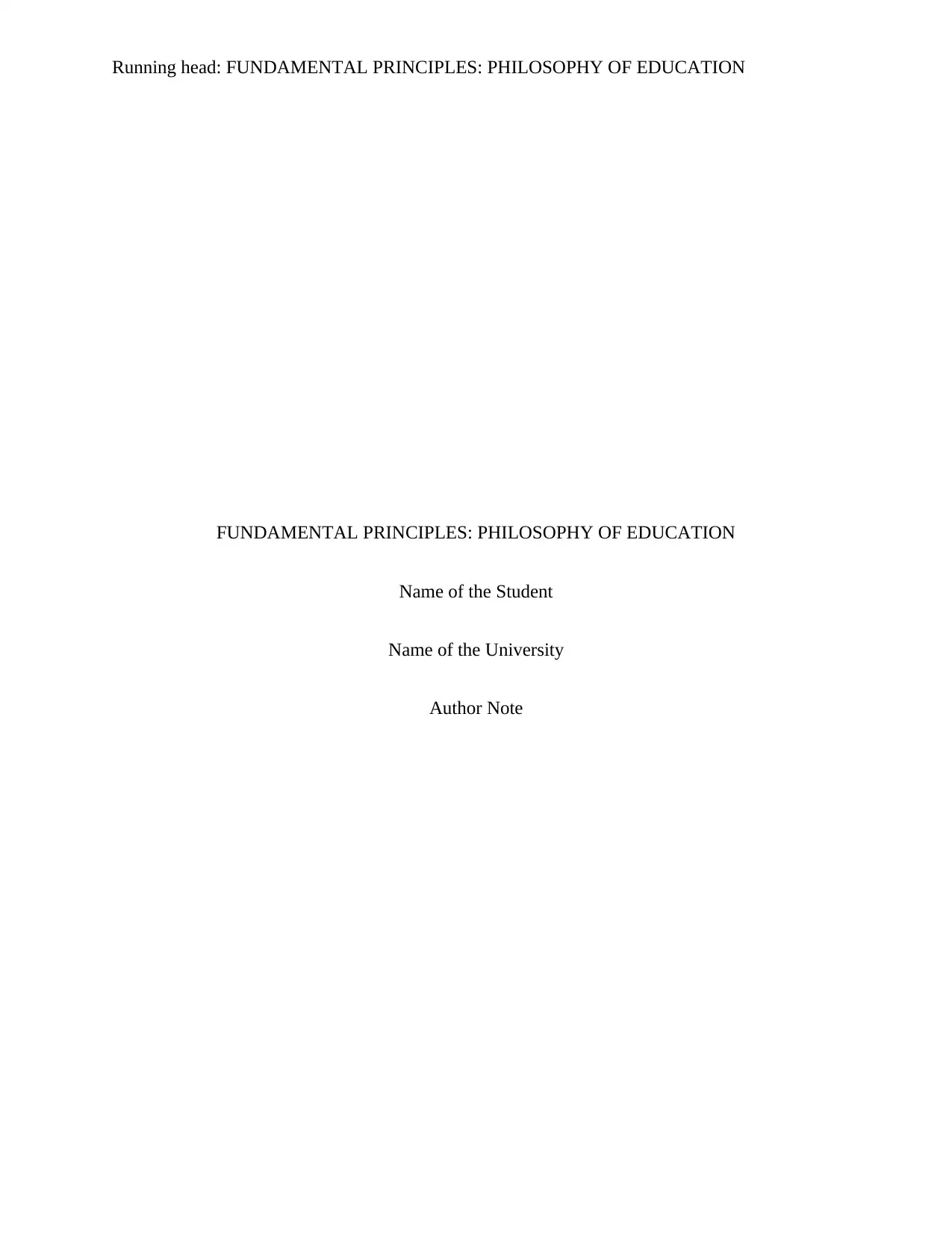
Running head: FUNDAMENTAL PRINCIPLES: PHILOSOPHY OF EDUCATION
FUNDAMENTAL PRINCIPLES: PHILOSOPHY OF EDUCATION
Name of the Student
Name of the University
Author Note
FUNDAMENTAL PRINCIPLES: PHILOSOPHY OF EDUCATION
Name of the Student
Name of the University
Author Note
Paraphrase This Document
Need a fresh take? Get an instant paraphrase of this document with our AI Paraphraser
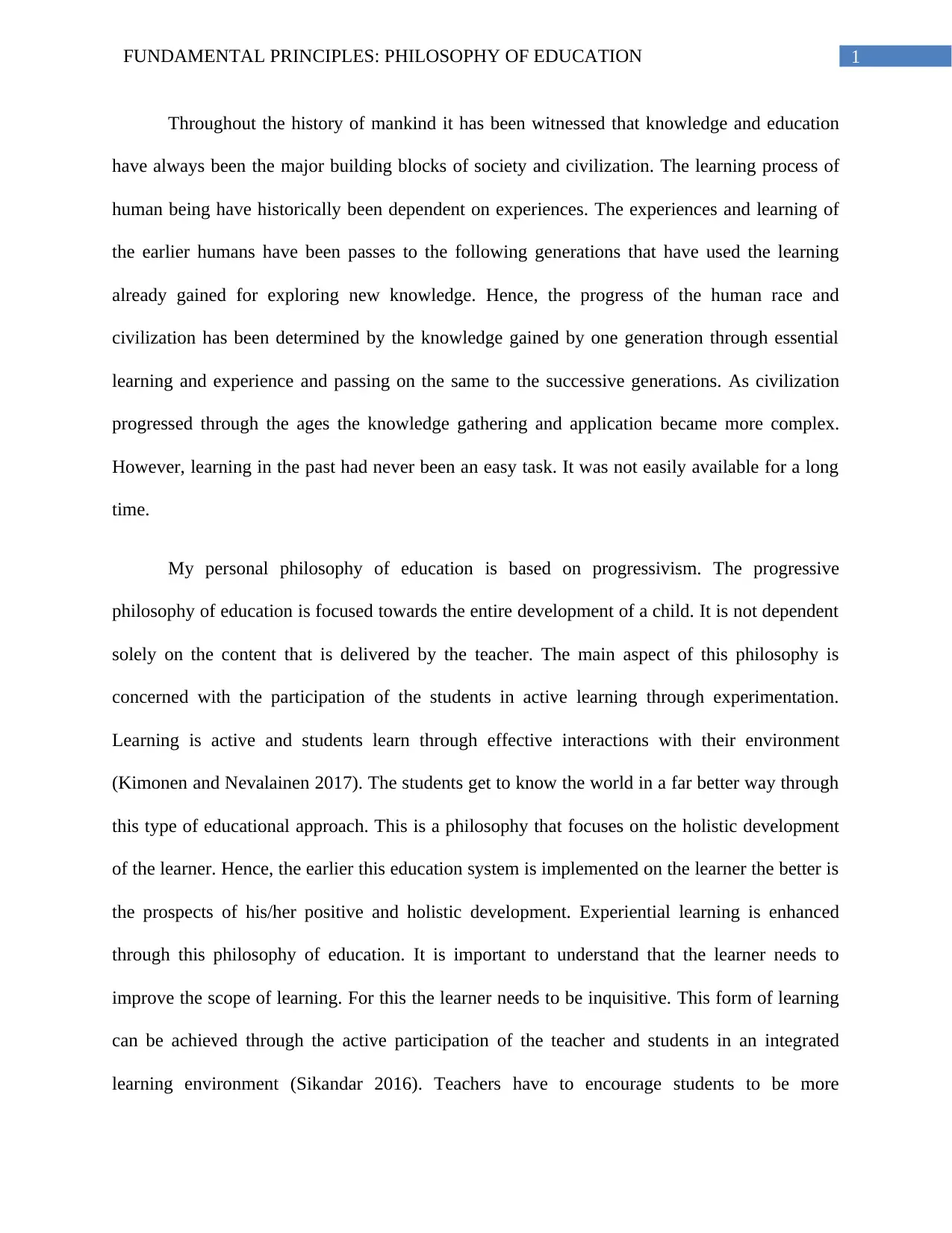
1FUNDAMENTAL PRINCIPLES: PHILOSOPHY OF EDUCATION
Throughout the history of mankind it has been witnessed that knowledge and education
have always been the major building blocks of society and civilization. The learning process of
human being have historically been dependent on experiences. The experiences and learning of
the earlier humans have been passes to the following generations that have used the learning
already gained for exploring new knowledge. Hence, the progress of the human race and
civilization has been determined by the knowledge gained by one generation through essential
learning and experience and passing on the same to the successive generations. As civilization
progressed through the ages the knowledge gathering and application became more complex.
However, learning in the past had never been an easy task. It was not easily available for a long
time.
My personal philosophy of education is based on progressivism. The progressive
philosophy of education is focused towards the entire development of a child. It is not dependent
solely on the content that is delivered by the teacher. The main aspect of this philosophy is
concerned with the participation of the students in active learning through experimentation.
Learning is active and students learn through effective interactions with their environment
(Kimonen and Nevalainen 2017). The students get to know the world in a far better way through
this type of educational approach. This is a philosophy that focuses on the holistic development
of the learner. Hence, the earlier this education system is implemented on the learner the better is
the prospects of his/her positive and holistic development. Experiential learning is enhanced
through this philosophy of education. It is important to understand that the learner needs to
improve the scope of learning. For this the learner needs to be inquisitive. This form of learning
can be achieved through the active participation of the teacher and students in an integrated
learning environment (Sikandar 2016). Teachers have to encourage students to be more
Throughout the history of mankind it has been witnessed that knowledge and education
have always been the major building blocks of society and civilization. The learning process of
human being have historically been dependent on experiences. The experiences and learning of
the earlier humans have been passes to the following generations that have used the learning
already gained for exploring new knowledge. Hence, the progress of the human race and
civilization has been determined by the knowledge gained by one generation through essential
learning and experience and passing on the same to the successive generations. As civilization
progressed through the ages the knowledge gathering and application became more complex.
However, learning in the past had never been an easy task. It was not easily available for a long
time.
My personal philosophy of education is based on progressivism. The progressive
philosophy of education is focused towards the entire development of a child. It is not dependent
solely on the content that is delivered by the teacher. The main aspect of this philosophy is
concerned with the participation of the students in active learning through experimentation.
Learning is active and students learn through effective interactions with their environment
(Kimonen and Nevalainen 2017). The students get to know the world in a far better way through
this type of educational approach. This is a philosophy that focuses on the holistic development
of the learner. Hence, the earlier this education system is implemented on the learner the better is
the prospects of his/her positive and holistic development. Experiential learning is enhanced
through this philosophy of education. It is important to understand that the learner needs to
improve the scope of learning. For this the learner needs to be inquisitive. This form of learning
can be achieved through the active participation of the teacher and students in an integrated
learning environment (Sikandar 2016). Teachers have to encourage students to be more
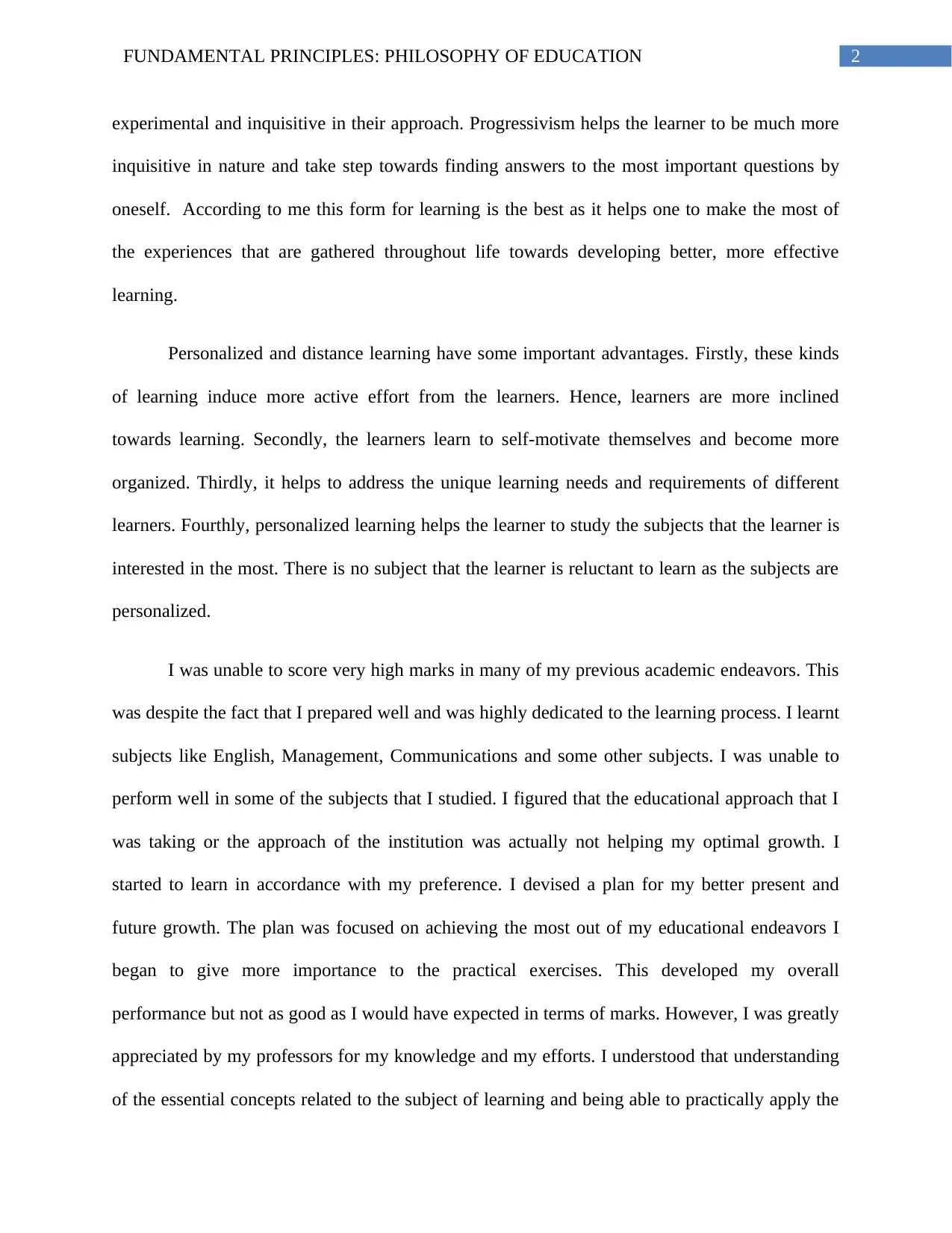
2FUNDAMENTAL PRINCIPLES: PHILOSOPHY OF EDUCATION
experimental and inquisitive in their approach. Progressivism helps the learner to be much more
inquisitive in nature and take step towards finding answers to the most important questions by
oneself. According to me this form for learning is the best as it helps one to make the most of
the experiences that are gathered throughout life towards developing better, more effective
learning.
Personalized and distance learning have some important advantages. Firstly, these kinds
of learning induce more active effort from the learners. Hence, learners are more inclined
towards learning. Secondly, the learners learn to self-motivate themselves and become more
organized. Thirdly, it helps to address the unique learning needs and requirements of different
learners. Fourthly, personalized learning helps the learner to study the subjects that the learner is
interested in the most. There is no subject that the learner is reluctant to learn as the subjects are
personalized.
I was unable to score very high marks in many of my previous academic endeavors. This
was despite the fact that I prepared well and was highly dedicated to the learning process. I learnt
subjects like English, Management, Communications and some other subjects. I was unable to
perform well in some of the subjects that I studied. I figured that the educational approach that I
was taking or the approach of the institution was actually not helping my optimal growth. I
started to learn in accordance with my preference. I devised a plan for my better present and
future growth. The plan was focused on achieving the most out of my educational endeavors I
began to give more importance to the practical exercises. This developed my overall
performance but not as good as I would have expected in terms of marks. However, I was greatly
appreciated by my professors for my knowledge and my efforts. I understood that understanding
of the essential concepts related to the subject of learning and being able to practically apply the
experimental and inquisitive in their approach. Progressivism helps the learner to be much more
inquisitive in nature and take step towards finding answers to the most important questions by
oneself. According to me this form for learning is the best as it helps one to make the most of
the experiences that are gathered throughout life towards developing better, more effective
learning.
Personalized and distance learning have some important advantages. Firstly, these kinds
of learning induce more active effort from the learners. Hence, learners are more inclined
towards learning. Secondly, the learners learn to self-motivate themselves and become more
organized. Thirdly, it helps to address the unique learning needs and requirements of different
learners. Fourthly, personalized learning helps the learner to study the subjects that the learner is
interested in the most. There is no subject that the learner is reluctant to learn as the subjects are
personalized.
I was unable to score very high marks in many of my previous academic endeavors. This
was despite the fact that I prepared well and was highly dedicated to the learning process. I learnt
subjects like English, Management, Communications and some other subjects. I was unable to
perform well in some of the subjects that I studied. I figured that the educational approach that I
was taking or the approach of the institution was actually not helping my optimal growth. I
started to learn in accordance with my preference. I devised a plan for my better present and
future growth. The plan was focused on achieving the most out of my educational endeavors I
began to give more importance to the practical exercises. This developed my overall
performance but not as good as I would have expected in terms of marks. However, I was greatly
appreciated by my professors for my knowledge and my efforts. I understood that understanding
of the essential concepts related to the subject of learning and being able to practically apply the
⊘ This is a preview!⊘
Do you want full access?
Subscribe today to unlock all pages.

Trusted by 1+ million students worldwide
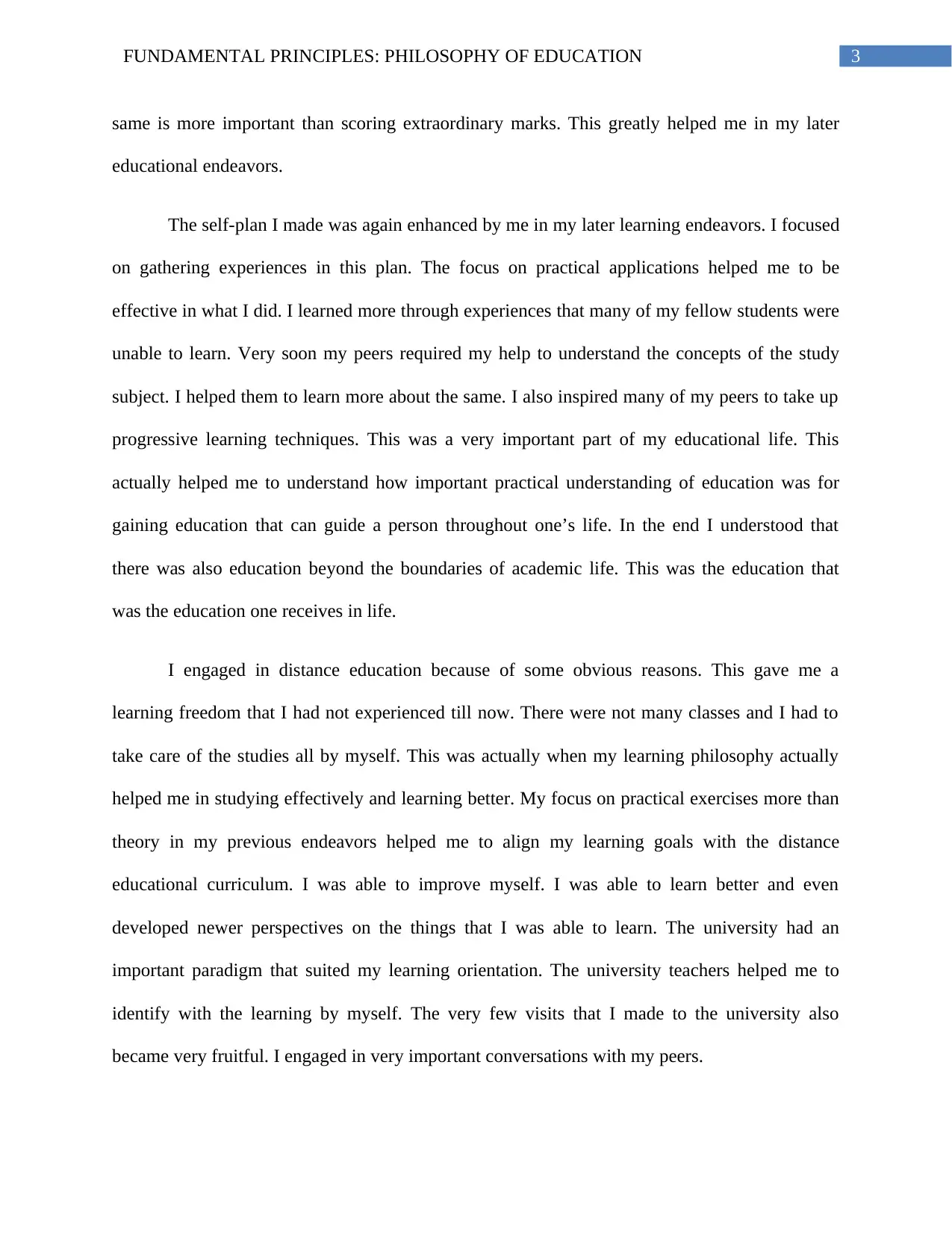
3FUNDAMENTAL PRINCIPLES: PHILOSOPHY OF EDUCATION
same is more important than scoring extraordinary marks. This greatly helped me in my later
educational endeavors.
The self-plan I made was again enhanced by me in my later learning endeavors. I focused
on gathering experiences in this plan. The focus on practical applications helped me to be
effective in what I did. I learned more through experiences that many of my fellow students were
unable to learn. Very soon my peers required my help to understand the concepts of the study
subject. I helped them to learn more about the same. I also inspired many of my peers to take up
progressive learning techniques. This was a very important part of my educational life. This
actually helped me to understand how important practical understanding of education was for
gaining education that can guide a person throughout one’s life. In the end I understood that
there was also education beyond the boundaries of academic life. This was the education that
was the education one receives in life.
I engaged in distance education because of some obvious reasons. This gave me a
learning freedom that I had not experienced till now. There were not many classes and I had to
take care of the studies all by myself. This was actually when my learning philosophy actually
helped me in studying effectively and learning better. My focus on practical exercises more than
theory in my previous endeavors helped me to align my learning goals with the distance
educational curriculum. I was able to improve myself. I was able to learn better and even
developed newer perspectives on the things that I was able to learn. The university had an
important paradigm that suited my learning orientation. The university teachers helped me to
identify with the learning by myself. The very few visits that I made to the university also
became very fruitful. I engaged in very important conversations with my peers.
same is more important than scoring extraordinary marks. This greatly helped me in my later
educational endeavors.
The self-plan I made was again enhanced by me in my later learning endeavors. I focused
on gathering experiences in this plan. The focus on practical applications helped me to be
effective in what I did. I learned more through experiences that many of my fellow students were
unable to learn. Very soon my peers required my help to understand the concepts of the study
subject. I helped them to learn more about the same. I also inspired many of my peers to take up
progressive learning techniques. This was a very important part of my educational life. This
actually helped me to understand how important practical understanding of education was for
gaining education that can guide a person throughout one’s life. In the end I understood that
there was also education beyond the boundaries of academic life. This was the education that
was the education one receives in life.
I engaged in distance education because of some obvious reasons. This gave me a
learning freedom that I had not experienced till now. There were not many classes and I had to
take care of the studies all by myself. This was actually when my learning philosophy actually
helped me in studying effectively and learning better. My focus on practical exercises more than
theory in my previous endeavors helped me to align my learning goals with the distance
educational curriculum. I was able to improve myself. I was able to learn better and even
developed newer perspectives on the things that I was able to learn. The university had an
important paradigm that suited my learning orientation. The university teachers helped me to
identify with the learning by myself. The very few visits that I made to the university also
became very fruitful. I engaged in very important conversations with my peers.
Paraphrase This Document
Need a fresh take? Get an instant paraphrase of this document with our AI Paraphraser
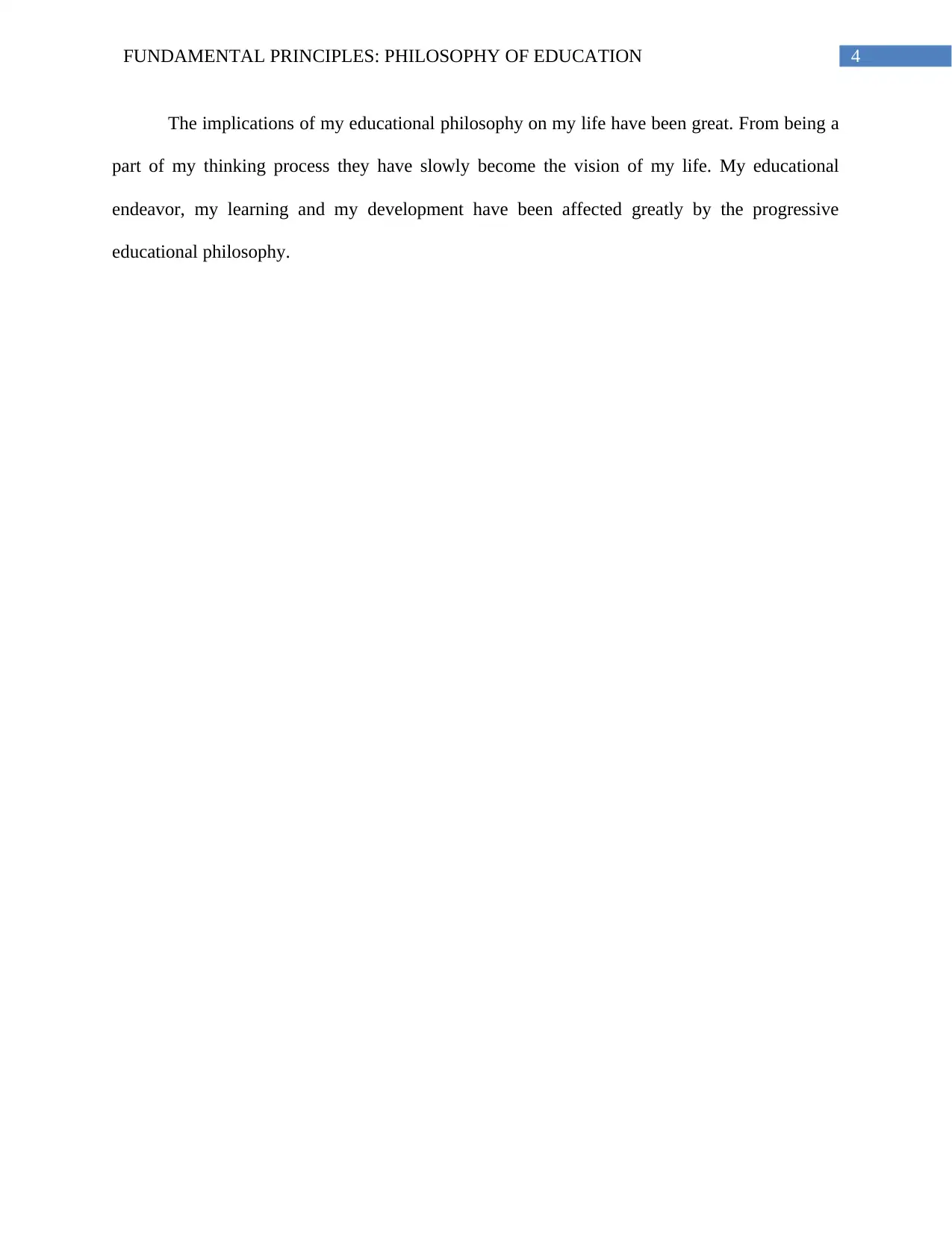
4FUNDAMENTAL PRINCIPLES: PHILOSOPHY OF EDUCATION
The implications of my educational philosophy on my life have been great. From being a
part of my thinking process they have slowly become the vision of my life. My educational
endeavor, my learning and my development have been affected greatly by the progressive
educational philosophy.
The implications of my educational philosophy on my life have been great. From being a
part of my thinking process they have slowly become the vision of my life. My educational
endeavor, my learning and my development have been affected greatly by the progressive
educational philosophy.
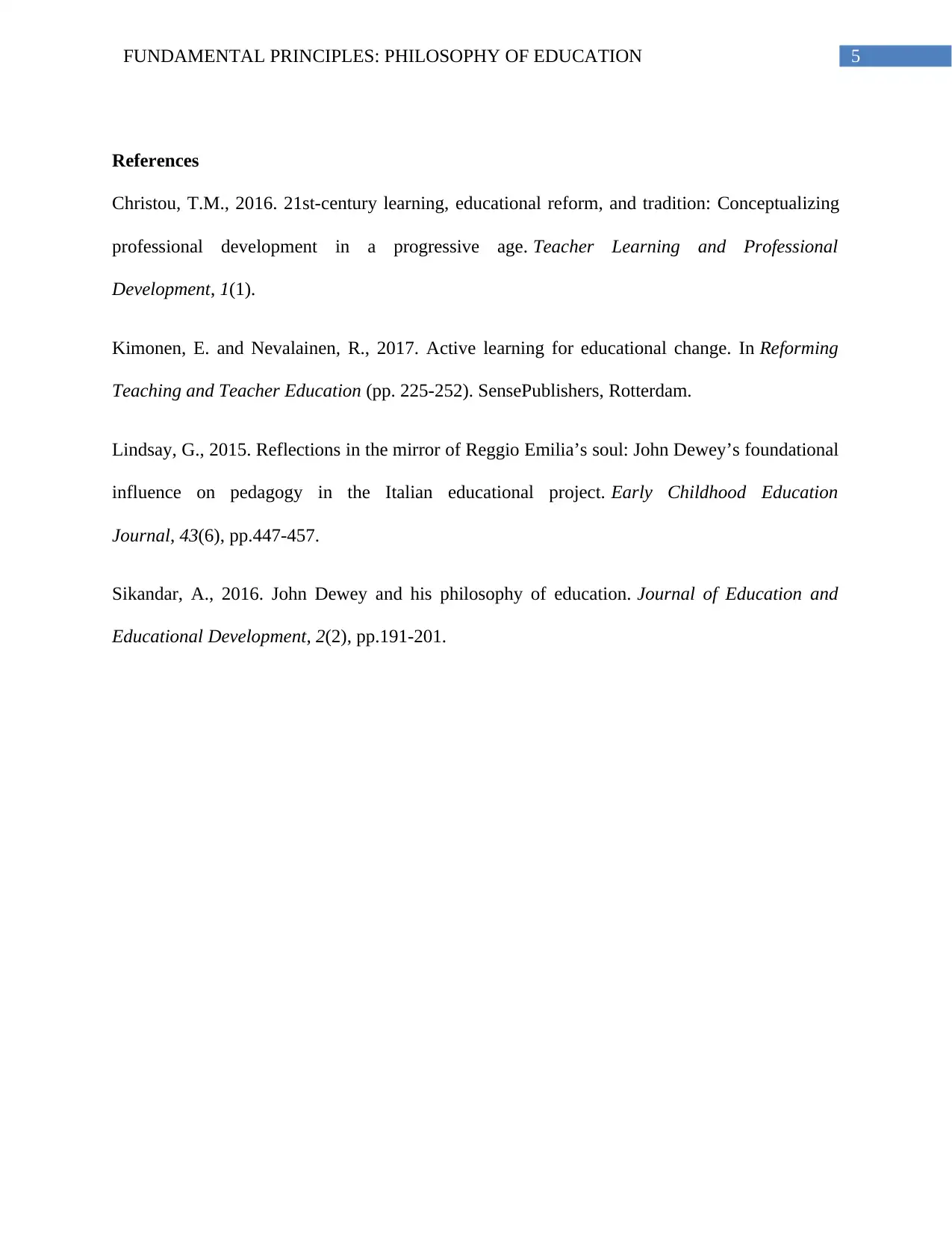
5FUNDAMENTAL PRINCIPLES: PHILOSOPHY OF EDUCATION
References
Christou, T.M., 2016. 21st-century learning, educational reform, and tradition: Conceptualizing
professional development in a progressive age. Teacher Learning and Professional
Development, 1(1).
Kimonen, E. and Nevalainen, R., 2017. Active learning for educational change. In Reforming
Teaching and Teacher Education (pp. 225-252). SensePublishers, Rotterdam.
Lindsay, G., 2015. Reflections in the mirror of Reggio Emilia’s soul: John Dewey’s foundational
influence on pedagogy in the Italian educational project. Early Childhood Education
Journal, 43(6), pp.447-457.
Sikandar, A., 2016. John Dewey and his philosophy of education. Journal of Education and
Educational Development, 2(2), pp.191-201.
References
Christou, T.M., 2016. 21st-century learning, educational reform, and tradition: Conceptualizing
professional development in a progressive age. Teacher Learning and Professional
Development, 1(1).
Kimonen, E. and Nevalainen, R., 2017. Active learning for educational change. In Reforming
Teaching and Teacher Education (pp. 225-252). SensePublishers, Rotterdam.
Lindsay, G., 2015. Reflections in the mirror of Reggio Emilia’s soul: John Dewey’s foundational
influence on pedagogy in the Italian educational project. Early Childhood Education
Journal, 43(6), pp.447-457.
Sikandar, A., 2016. John Dewey and his philosophy of education. Journal of Education and
Educational Development, 2(2), pp.191-201.
⊘ This is a preview!⊘
Do you want full access?
Subscribe today to unlock all pages.

Trusted by 1+ million students worldwide
1 out of 6
Related Documents
Your All-in-One AI-Powered Toolkit for Academic Success.
+13062052269
info@desklib.com
Available 24*7 on WhatsApp / Email
![[object Object]](/_next/static/media/star-bottom.7253800d.svg)
Unlock your academic potential
Copyright © 2020–2025 A2Z Services. All Rights Reserved. Developed and managed by ZUCOL.





